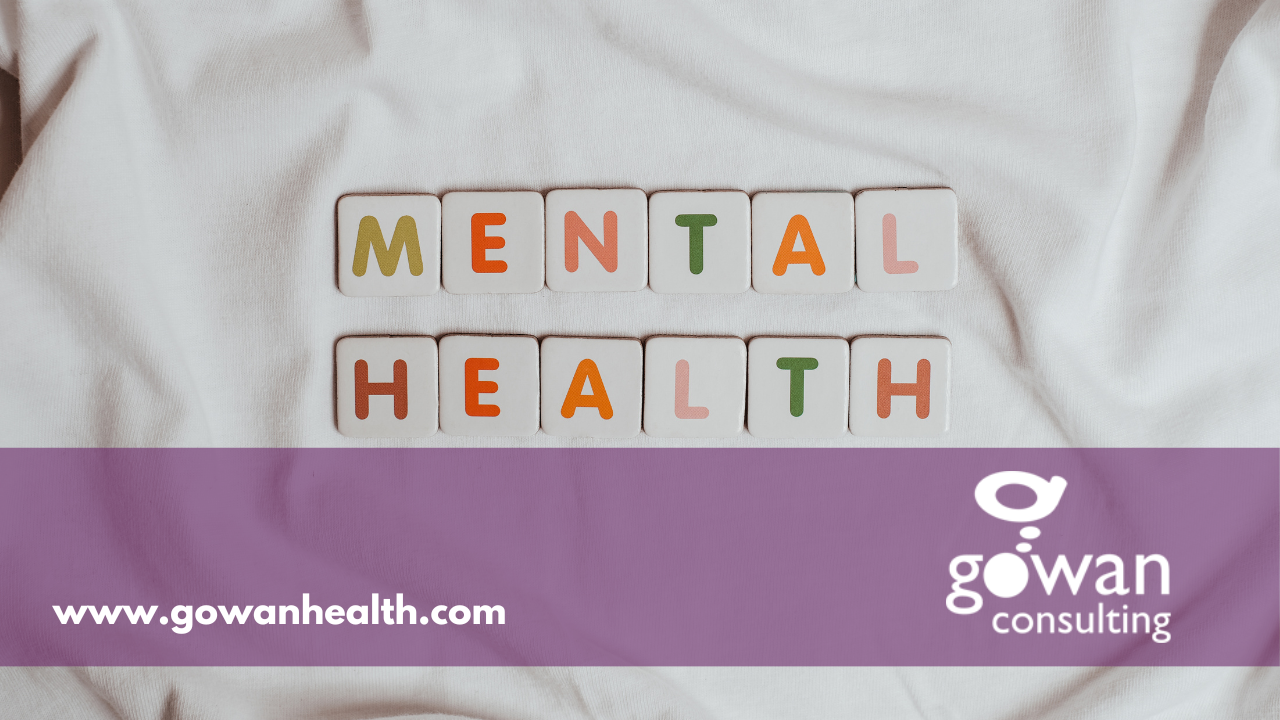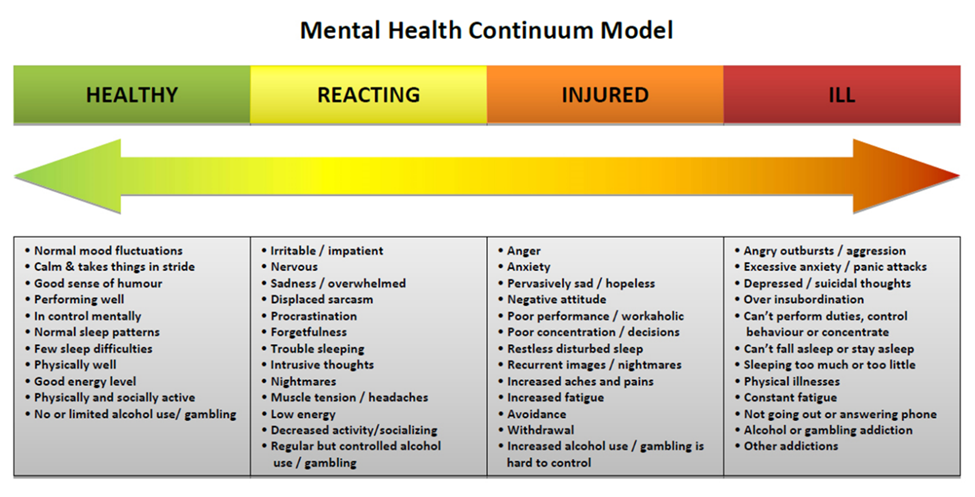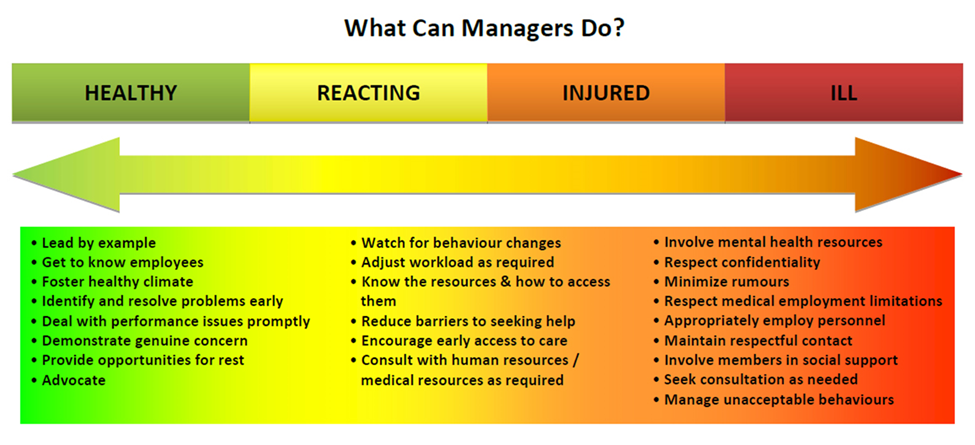The Mental Health Continuum
May 25, 2023
A lot of people automatically think of mental illness when they hear the words mental health. However, just like physical health, everyone has mental health. Mental health refers to an individual’s psychological and emotional well-being, whether it’s in a negative or positive state. A common misconception is that when our mental health is suffering, it means we have a mental illness. This is not the case! You can be unwell mentally at any point in time due to a number of contributing factors.
It’s important that employees maintain their mental health just as they would their physical health. When an individual feels they are coming down with a cold, they take precautions and certain measures to feel better. The same is the case for mental health – we must maintain it in order to be productive in the workplace and to be engaged in other meaningful activities in our lives.
Mental Health and Mental Illness
Mental illness refers to the psychiatric disorders defined by behavioural or mental patterns that cause significant distress or impairment of personal functioning. The types of mental illness include anxiety disorders, mood disorders, psychotic disorders, personality disorders, eating disorders and sleep disorders. These are caused by chemical imbalances in the hormones and neurotransmitters in the brain. Just like physical disorders, some individuals are more predisposed to the likelihood of developing a mental illness; however, anyone can experience a mental illness. There are several different forms of treatment and coping strategies available to help individuals who are diagnosed with a mental illness function at a regular level and live fulfilling lives.
So what about everyone else? If we don’t have a mental illness, why would we need to take care of our mental health? When our mental health is low, it impacts our regular functioning and can eventually lead to poor physical health. Typically, when mental health is poor for someone who does not have a mental illness, it is usually caused by external environmental factors versus internal biological factors. Some examples of poor mental health include the following:
- Being overly stressed or overwhelmed – maybe caused by work, relationships, school or finances
- Feeling sad over a loss
- Being anxious due to an upcoming event, such as a big test or important event
- Feelings of being unfulfilled due to a lack of self-care
- Experiencing compassion fatigue or burnout
How do I know when someone is distressed?
When stress occurs, we can move down the mental health continuum into reacting, injured and illness if we do not look after our mental wellbeing. Noticing distress can be as simple as noting a change in behaviour or interaction in another person. As stressors increase and we do not look after our self-care, we can become more unwell. The further down the continuum we get, the more help we need to get back to healthy.

How Can We Take Care of Our Mental Health?
The unique thing about mental health is how different it is for every single person. What works for one person to increase their mental health may not work for another. The key is to engage is self-exploration to understand what kind of factors decrease your mental health and well being, and what factors increase and improve your mental health when it has declined. The Mental Health Commission of Canada recommends the following actions at each phase in the continuum:
Healthy:
- Focus on task at hand
- Break problems into manageable tasks
- Controlled, deep breathing
- Nurture a support system
Reacting:
- Recognize limits, take breaks
- Get enough rest, food, exercise
- Reduce barriers to help-seeking
- Identify and resolve problems early
- Take personal accountability
Injured:
- Talk to someone, ask for help
- Tune into own signs of distress
- Make self-care a priority
- Get help sooner, not later
- Maintain social contact, don’t withdraw
Ill:
- Follow care recommendations
- Seek consultation as needed
- Respect confidentiality
- Know resources and how to access them
Self-Care Tips
Everyone is different, but here are some universal self care tips that have statistically shown to result in positive well-being!
- Practice gratitude – focus on the things in your life you are grateful for
- Practice mindfulness – try grounding techniques and being present in the moment
- Take time for the things that matter to you – hobbies, reading, getting out in nature, etc.
- Engage in social interactions – laughing with friends and spending time with loved ones
- Participate in physical resiliency activities such as exercise, sports or going for walks
There is a lot of things you can do to keep your mental health in a positive range – but it has to be meaningful to you as an individual! Sometimes, in the case of mental illness, there is a hormonal or neurotransmitter issue within the chemistry of the brain. In these instances, an individual may need further intervention and should speak with their doctor.
What Can Employers Do?
- Learn the warning signs and look for signs of distress. These include suicidal ideation, substance abuse, expression of purposelessness and hopelessness, withdrawal, anger, recklessness and a significant change in mood.
- Develop strong psychological health programs. Prioritize your team’s mental health just as much as their physical health.
- Check in regularly. Let your employees know you are accessible and that you care about their mental health. Listen to your employees with empathy, attention, and respect.
- Offer mental health resources and training. Provide employees training on ways to improve mental health, including programs on resiliency, reducing mental health stigma, and manager mental health training.
- Model healthy workplace behaviours as a leader in your workplace.
- Make a referral. You can request the assistance of an Occupational Therapist to help employees find tools and strategies through Cognitive Behavioural Therapy.

How Can Gowan Consulting Help?
Gowan Consulting has Occupational Therapists for assisting with managing mental health in the workplace. We’re in a new era of inspiring positive change surrounding mental health in the workplace, and we want to talk about it, understand it, and be open about it!
Gowan Consulting can assist with auditing for risks and implementing the psychological health and safety in the workplace standards. Our Occupational Therapists can provide training to your managers on supporting mental health in the workplace and provide training for employees on mental health resiliency.
Training Opportunities
- Start with ensuring that managers have the training needed to support accommodations in the workplace by having your managers attend Manager Mental Health Training or Inclusive Leadership Training.
- Join our Mastering Health and Productivity Membership to obtain the latest information, tools, and strategies to manage your workplace health concerns.
- Set up a time to talk about your workplace needs with our consultants.
- If you would like to learn more about resiliency, mental health training and other various resources, check out more of our webinars on www.gowanhealth.com/store.
For more on all we have to offer, contact us or make a referral today. We want to help make the difference in your healthy business.
References
Mental Health Continuum Model, Mental Health Commission of Canada, 2017, https://theworkingmind.ca/sites/default/files/resources/r2mr_poster_en.pdf
The Fundamentals – Employers’ Responsibilities, Government of Canada, https://www.canada.ca/en/government/publicservice/wellness-inclusion-diversity-public-service/health-wellness-public-servants/disability-management/fundamentals-employers-responsibilities.html
Images sourced from Government of Canada website

